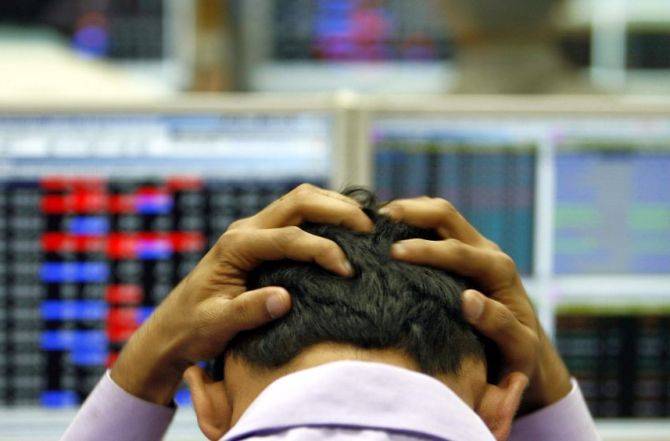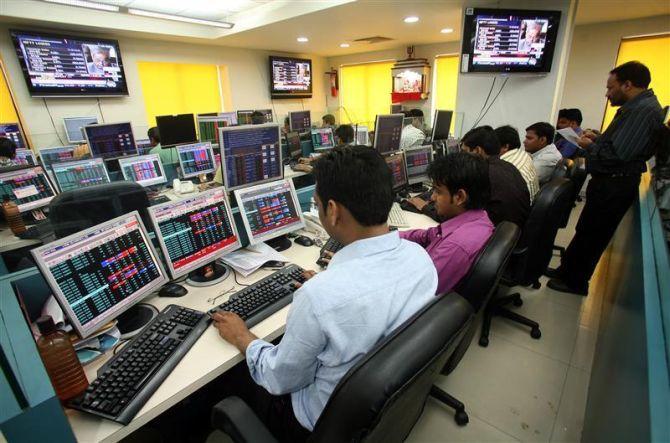Photographs: Arko Datta/Reuters
Investors usually have past peaks of Index etched into their minds.
October finished with a Sensex reading of 21,164, a new closing high for the index.
These new highs are signposts of a level that was first touched in January 2008. Such events will induce you to take some action in the markets. Should you now sell, or should you buy more? You don’t have to do either.
Investors usually have past peaks of the index etched in their minds. They usually have a very negative feelings about the past peaks.
They remember it as a time, when they could have sold their stocks and could have easily bought these later at a lower price, keeping the stock and the profit, too, in their own pockets.
Many investors would have bought a good number of stocks at or near the peak. So they would be tempted to sell at no-loss levels after nursing their losses for over five long years.
A new high means nothing to a major part of the markets, although the Sensex managed to close at an all-time high, the majority - 77 per cent of the stocks - are still in the red.
...
Should you sell or buy more stocks now?
Photographs: Reuters
Consider this data: A third of the stocks are quoting at less than 80 per cent of the price as of January 2008. If one were to consider a lower loss of 50 per cent, then you will find 57 per cent of the stocks have given you little, despite waiting for more than 70 months.
So don’t judge your own performance through the performance of the index. Study your portfolio and then take a call on whether to buy more or book your losses or gains.
You must have heard a lot of the so-called market pundits telling you this rally was liquidity driven. They are both right and wrong.
The foreign institutional investors (FII) have pumped more than Rs 30,000 crore (Rs 300 billion) in the last two months. But we want to ask them to name a single rally that was not liquidity driven?
FII holding is on the rise while public shareholding is on the wane. Liquidity drives all rallies. So this rally is no different.
...
Should you sell or buy more stocks now?
Photographs: Reuters
The US Federal Reserve’s tapering may have to wait. The Federal Open Market Committee, the policy making arm of the Fed, is the fountain-head of liquidity. It is pumping $85 billion each month or $1 billion annually of liquidity by the way of quantitative easing into the system. This is likely to be maintained through March 2014.
Indian valuations are still in acceptable territory: Looking purely at price to earnings (P/E) ratio, we are better placed than 2008, when the Nifty made an all-time high of 6,357. Our P/E at that time was 25.5. With the Nifty at 6,299, we are now better placed with a lower P/E of 15.
GDP and markets will reconcile their accounts in the coming few years. The markets have merely come back to the levels they were in 2008. In the interim, GDP has kept growing and right now, the market cap to GDP ratio is close to 0.75.
And while both don’t keep pace with each other constantly, over a longer period, they both reconcile their accounts and the markets can go to one time GDP without entering excessive valuations.
...
Should you sell or buy more stocks now?
Photographs: Reuters
The manufacturing and services sectors are in contraction mode. The corporate growth rate is also slowing. But amid this dismal situation, there is a hope that come 2014, they will elect a new and a stable government, which can push the country forward.
Positive sentiment is an elixir and this, along with the delay in tapering, has pushed our markets northwards. For the time being, don’t let the altitude get to your head. Take a cool decision of reviewing your portfolio.
We believe dollar revenue sectors, such as information technology, pharmaceuticals and middle-class consumption sectors represented by fast moving consumer goods, telecom and media, are likely to lead this market.
Financials are a good longer term bet as these are likely to continue facing headwinds in the next two quarters.
After five years of consolidation, Indian markets are on a cusp of a new trend. Markets never rise in a single line. There will be intermediate correction but that is the nature of the beast. Learn to live with these gyrations and do not miss the woods for the trees.
The author is MD & CEO, HDFC Securities.






article